Yes, I’m back, dipping my toes cautiously into the social media waters, gauging my mental state. I have a lot going on professionally right now, and I need to write about it, to boost the signal (as the market phrase would have it), to shout it from the virtual rooftops.
And so, I’m venturing back out into the digital world. But you, who have put up with me disappearing now and again, deserve a bit of an explanation for my sudden withdrawal back in early July.
The short version is this: Our older daughter, who has been battling cancer since March 2021, had an unexpected setback. “Unexpected” as in out of the blue. All (or at least almost all) the indicators had been looking pretty good, pointing toward slow but measurable progress. And then one scan — a formality, dotting the “i”s and crossing the “t”s — came back with unambiguously bad results. Bad.
We were devastated, and I needed time. As it happened, at that point in the summer, Nancy and I were preparing for a long stretch of travel, and I would have needed to write several weeks worth of blog posts in advance and schedule them for our time away. I couldn’t do it. I couldn’t bring myself to write a bunch of happy, chatty posts when I was shattered.
Hence, my pull-back.
Our daughter is back in chemotherapy. We’ll find out before too long whether it is working as we hope or if her doctors will need to try something else. In the meantime, she is doing remarkably well. The side-effects of this particular drug are, mercifully, not too terrible. She is working as usual on non-treatment days. She is seeing friends, going to parties, having fun. She is a wonder. A force of nature. Her courage and strength and resilience and determination humble me. I am embarrassed by my own fragility. But I’m a parent and my kid is sick and I can’t do a damn thing to make it all better. Isn’t that what dads are supposed to do? Make it all better? I feel helpless.
But given all she is doing for herself, how can I do any less than step back into the world, be a professional, and live my life as best I can?
So . . . .
I am currently working on my new contemporary Celtic urban fantasy. I have recently revised the first book, The Fugitive Stone, and am now about to submit for editorial feedback the second book, The Demon Cauldron. The third book, The Lost Sword, is about two-thirds written. I’ll be resuming work on it soon.
The Kickstarter for the new set of Zombies Need Brains anthologies is live and it needs your support! We have four anthologies in this year’s set, including Dragonesque, an anthology of stories from the dragon’s point of view, for which I will be writing a story, and Artifice and Craft, an anthology of stories about magical or supernatural works of art that I am editing with my wonderful friend, Edmund R. Schubert. We are halfway to our funding goal, but that leaves us with some fundraising distance to travel in the three weeks we have left. Please, please, please help us out.
I am also continuing to edit on a freelance basis, as I have been for about a year now.
And I am preparing for a couple of upcoming professional events. I will be a guest at this year’s DragonCon, my first appearance at the con since 2018. I can’t wait to get back to our genre’s version of Mardi Gras — it’s always a highlight of my professional year, and it’s been too long. DragonCon takes place in Atlanta, the first weekend of September.
And later in September, I will be an instructor at the Hampton Roads Writers Conference, leading workshops on Point of View, Character Development and Character Arc, World Building, and Pacing and Narrative Arc.
Busy times. Difficult times. But I think that’s true for all of us. We all struggle. We all find ways to cope, to overcome, or at least to distract and scrape by.
I mentioned our travel — Nancy and I went to Colorado, where we had a wonderful visit with our younger daughter and her partner. From there, we went to Boise, to see Nancy’s family. And finally, we spent nearly a week in the area around Bozeman, hiking every day, looking at birds and butterflies, the brilliant hues of wildflowers and mountain vistas that stole our breath. Maybe I’ll post a few photos in the weeks to come.
Thank you for your understanding when I needed to step away from social media. Thank you for the warm, welcoming embrace of your friendship as I return. Going forward, I will try to do better.









 My editor at Belle Books is a woman named Debra Dixon, and she is a truly remarkable editor. This first book in the Celtic series is our third novel together, after Radiants and Invasives. In our time together, I have never once felt that her responses to my work were intrusive or unhelpful. With each book it’s been clear to me that her every observation, every criticism, every suggestion, is intended to help me tell my story with the greatest impact and in the most concise and effective prose. A writer can’t ask for more. This doesn’t mean I have agreed with every one of her comments. Now and then, I have felt strongly enough about one point or another to push back. And she’s fine with that. That’s how the editor-writer relationship is supposed to work, and she has always been crystal clear: In the end, my book is my book. But even when we have disagreed we have been clear on our shared goal: To make each book as good as it can be.
My editor at Belle Books is a woman named Debra Dixon, and she is a truly remarkable editor. This first book in the Celtic series is our third novel together, after Radiants and Invasives. In our time together, I have never once felt that her responses to my work were intrusive or unhelpful. With each book it’s been clear to me that her every observation, every criticism, every suggestion, is intended to help me tell my story with the greatest impact and in the most concise and effective prose. A writer can’t ask for more. This doesn’t mean I have agreed with every one of her comments. Now and then, I have felt strongly enough about one point or another to push back. And she’s fine with that. That’s how the editor-writer relationship is supposed to work, and she has always been crystal clear: In the end, my book is my book. But even when we have disagreed we have been clear on our shared goal: To make each book as good as it can be. My struggle right now is simply this: Her feedback on this first book is quite extensive and requires that I rethink some fundamental character issues and cut or change significantly several key early scenes. And she’s right about all this stuff. No doubt. This first book has been through several revisions already, and the second half of the book — really the last two-thirds of the book — just sings. I love it. She loves it. The first third is where the problems lie. To be honest, the first hundred (manuscript) pages of this book have always given me the most trouble. I wrote the initial iteration of the book more than a decade ago, and in some ways those early chapters still reflect too much the time in which they were written. They feel dated.
My struggle right now is simply this: Her feedback on this first book is quite extensive and requires that I rethink some fundamental character issues and cut or change significantly several key early scenes. And she’s right about all this stuff. No doubt. This first book has been through several revisions already, and the second half of the book — really the last two-thirds of the book — just sings. I love it. She loves it. The first third is where the problems lie. To be honest, the first hundred (manuscript) pages of this book have always given me the most trouble. I wrote the initial iteration of the book more than a decade ago, and in some ways those early chapters still reflect too much the time in which they were written. They feel dated.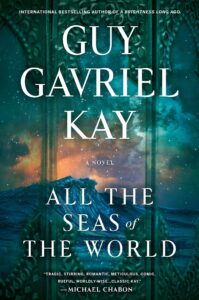 After publishing
After publishing 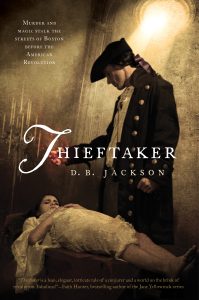 I would love to be a bestselling author. And with each new project I take on, I wonder if this might finally be the literary vehicle that gets me there. Thieftaker, Fearsson, the time travel books, the Radiants franchise. I had high hopes for all of them. All of them were critical successes. None of them has taken me to that next level commercially. So does that mean I should give up?
I would love to be a bestselling author. And with each new project I take on, I wonder if this might finally be the literary vehicle that gets me there. Thieftaker, Fearsson, the time travel books, the Radiants franchise. I had high hopes for all of them. All of them were critical successes. None of them has taken me to that next level commercially. So does that mean I should give up?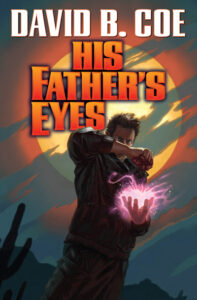 The difference between what I did with those two projects and what I am telling you not to do is this: I kept working on these books, but I also moved ahead with other projects, so that I wouldn’t stall my career. Yes, I worked for six years on the first Fearsson book. But in that time, I also wrote the Thieftaker books and the Robin Hood novelization. This, by the way, is also the secret to finding that balance I mentioned. By all means, keep working on the one idea, but do so while simultaneously developing others. Don’t become so obsessed with the one challenge that you lose sight of all else.
The difference between what I did with those two projects and what I am telling you not to do is this: I kept working on these books, but I also moved ahead with other projects, so that I wouldn’t stall my career. Yes, I worked for six years on the first Fearsson book. But in that time, I also wrote the Thieftaker books and the Robin Hood novelization. This, by the way, is also the secret to finding that balance I mentioned. By all means, keep working on the one idea, but do so while simultaneously developing others. Don’t become so obsessed with the one challenge that you lose sight of all else. When I am not in these panels, I will be at my table in Author’s Alley, signing and selling books. I also plan to have with me some of
When I am not in these panels, I will be at my table in Author’s Alley, signing and selling books. I also plan to have with me some of 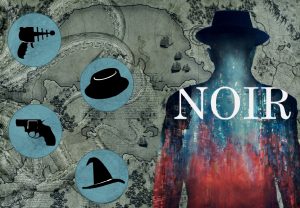 Mostly, as I say, I’ve been editing. My work. Other people’s work. The Noir anthology. I’ve been plenty busy, but I have not been as productive creatively as I would like. And I wonder if this is because of
Mostly, as I say, I’ve been editing. My work. Other people’s work. The Noir anthology. I’ve been plenty busy, but I have not been as productive creatively as I would like. And I wonder if this is because of 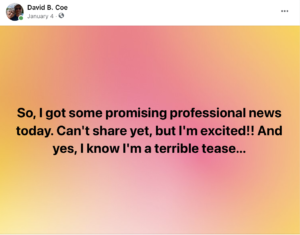 Nearly two months ago, early in the new year, I posted on social media that I had some exciting professional news I couldn’t share quite yet. I was thrilled, and wanted to let people know. But I also didn’t want to say anything before all the details had been settled. So I posted my little teaser, forgetting the one immutable rule of the publishing business: Things always happen slower than one thinks they will.
Nearly two months ago, early in the new year, I posted on social media that I had some exciting professional news I couldn’t share quite yet. I was thrilled, and wanted to let people know. But I also didn’t want to say anything before all the details had been settled. So I posted my little teaser, forgetting the one immutable rule of the publishing business: Things always happen slower than one thinks they will.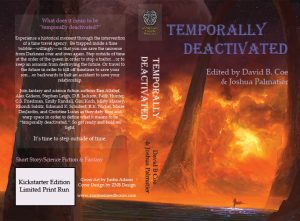 Since writing it, though, I have become sort of fixated on the idea. I am editing my fourth anthology, and already looking at the possibility of editing another. My freelance editing business is attracting a steady stream of clients — I’m booked through the spring and have had inquiries for slots later in the year.
Since writing it, though, I have become sort of fixated on the idea. I am editing my fourth anthology, and already looking at the possibility of editing another. My freelance editing business is attracting a steady stream of clients — I’m booked through the spring and have had inquiries for slots later in the year.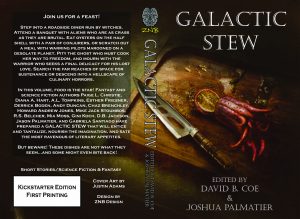 I am not an acquiring editor. I do decide, along with my co-editor, whose stories will be in the anthologies I edit, so I suppose in that way I am determining the fate of submissions and, in a sense, “buying” manuscripts. But, for now at least, I don’t make decisions about the fate of novels, and so I don’t have to go toe-to-toe with agents. Good thing. They scare me. (Looking at you, Lucienne Diver.)
I am not an acquiring editor. I do decide, along with my co-editor, whose stories will be in the anthologies I edit, so I suppose in that way I am determining the fate of submissions and, in a sense, “buying” manuscripts. But, for now at least, I don’t make decisions about the fate of novels, and so I don’t have to go toe-to-toe with agents. Good thing. They scare me. (Looking at you, Lucienne Diver.)